2014全国卷听力试题及原文
2014年高考英语全国1卷听力(录音+原文+答案)

2014年高考英语全国1卷听力(录音+原文+答案)听力下载链接:https:///s/15fBZw6-1yj309FrPWC-lBg提取码:12342014全国卷听力试题第一部分听力(共两节,满分30分)做题时,先将答案标在试卷上。
录音内容结束后,你将有两分钟的时间将试卷上的答案转涂到答题卡上。
第一节(共5小题;每小题1.5分,满分7.5分)听下面5段对话。
每段对话后有一个小题,从题中所给的A、B、C三个选项中选出最佳选项。
听完每段对话后,你都有10秒钟的时间来回答有关小题和阅读下一小题。
每段对话仅读一遍。
例:How much is the shirt?A. £19.15.B. £9.18.C. £9.15.答案是C。
1. What does the woman want to do?A. Find a place.B. Buy a map.C. Get an address.2. What will the man do for the woman?A. Repair her car.B. Give her a ride.C. Pick up her aunt.3. Who might Mr. Peterson be?A. A new professor.B. A department head.C. A company director.4. What does the man think of the book?A. Quite difficult.B. Very interesting.C. Too simple.5. What are the speakers talking about?A. Weather.B. Clothes.C. News.第二节(共15小题,每小题1.5分,满分22.5分)听下面5段对话或独白。
每段对话或独白后有几个小题,从题中所给的A、B、C三个选项中选出最佳选项。
2014高考英语听力原文及音频

2014高考英语听力原文及音频2014年高考英语全国卷听力真题+原文+答案111843_5546e513cc1e9.mp3第一节(共5小题;每小题1.5分,满分7.5分)听下面5段对话。
每段对话后有一个小题,从题中所给的A、B、C三个选项中选出最佳选项,并标在试卷的相应位置。
听完每段对话后,你都有10秒钟的时间来回答有关小题和阅读下一小题。
每段对话仅读一遍。
1. What does the woman want to do?A. Find a place.B. Buy a map.C. Get an address.2. What will the man do for the woman?A. Repair her car.B. Give her a ride.C. Pick up her aunt.3. Who might Mr. Peterson be?A. A new professor.B. A department head.C. A company director.4. What does the man think of the book?A. Quite difficult.B. Very interesting.C. Too simple.5. What are the speakers talking about?A. Weather.B. Clothes.C. News.第二节(共15小题;每小题1.5分,满分22.5分)听下面5段对话或独白。
每段对话或独白后有几个小题,从题中所给的A、B、C三个选项中选出最佳选项,并标在试卷的相应位置。
听每段对话或独白前,你将有时间阅读各个小题,每小题5秒钟;听完后,各小题给出5秒钟的作答时间。
每段对话或独白读两遍。
听第6段材料,回答第6、7题。
6. Why is Harry unwilling to join the woman?A. He has a pain in his knee.B. He wants to watch TV.C. He is too lazy.7. What will the woman probably do next?A. Stay at home.B. Take Harry to hospital.C. Do some exercise.听第7段材料,回答第8、9题。
2014年高考听力

2014年高考课标全国Ⅰ卷第一部分听力(共两节,满分30分)第一节(共5小题;每小题1.5分,满分7.5分)听下面5段对话。
每段对话后有一个小题,从题中所给的A、B、C三个选项中选出最佳选项,并标在试卷的相应位置。
听完每段对话后,你都有10秒钟的时间来回答有关小题和阅读下一小题。
每段对话仅读一遍。
例:How much is the shirt?A. £19.15.B. £9.18.C. £9.15.答案是 C。
1. What does the woman want to do?A. Find a place.B. Buy a map.C. Get an address.2. What will the man do for the woman?A. Repair her car.B. Give her a ride.C. Pick up her aunt.3. Who might Mr. Peterson be?A. A new professor.B. A department head.C. A company director.4. What does the man think of the book?A. Quite difficult.B. Very interesting.C. Too simple.5. What are the speakers talking about?A. Weather.B. Clothes.C. News.第二节(共15小题;每小题1.5分,满分22.5分)听下面5段对话或独白。
每段对话或独白后有几个小题,从题中所给的A、B、C三个选项中选出最佳选项,并标在试卷的相应位置。
听每段对话或独白前,你将有时间阅读各个小题,每小题5秒钟;听完后,各小题给出5秒钟的作答时间。
每段对话或独白读两遍。
听第6段材料,回答第6、7题。
6. Why is Harry unwilling to join the woman?A. He has a pain in his knee.B. He wants to watch TV.C. He is too lazy.7. What will the woman probably do next?A. Stay at home.B. Take Harry to hospital.C. Do some exercise.听第7段材料,回答第8、9题。
2014年全国统一高考英语试卷听力+原文+答案(新课标Ⅰ、Ⅱ)
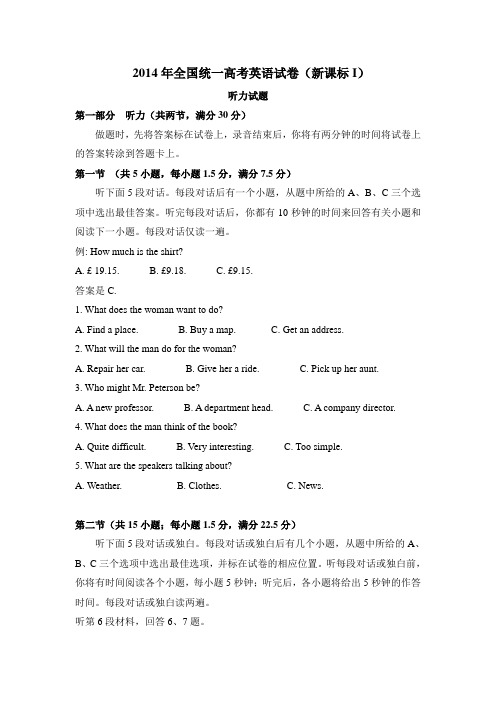
2014年全国统一高考英语试卷(新课标I)听力试题第一部分听力(共两节,满分30分)做题时,先将答案标在试卷上,录音结束后,你将有两分钟的时间将试卷上的答案转涂到答题卡上。
第一节(共5小题,每小题1.5分,满分7.5分)听下面5段对话。
每段对话后有一个小题,从题中所给的A、B、C三个选项中选出最佳答案。
听完每段对话后,你都有10秒钟的时间来回答有关小题和阅读下一小题。
每段对话仅读一遍。
例: How much is the shirt?A. £ 19.15.B. £9.18.C. £9.15.答案是C.1. What does the woman want to do?A. Find a place.B. Buy a map.C. Get an address.2. What will the man do for the woman?A. Repair her car.B. Give her a ride.C. Pick up her aunt.3. Who might Mr. Peterson be?A. A new professor.B. A department head.C. A company director.4. What does the man think of the book?A. Quite difficult.B. Very interesting.C. Too simple.5. What are the speakers talking about?A. Weather.B. Clothes.C. News.第二节(共15小题;每小题1.5分,满分22.5分)听下面5段对话或独白。
每段对话或独白后有几个小题,从题中所给的A、B、C三个选项中选出最佳选项,并标在试卷的相应位置。
听每段对话或独白前,你将有时间阅读各个小题,每小题5秒钟;听完后,各小题将给出5秒钟的作答时间。
2014高考全国II卷 英语听力原文
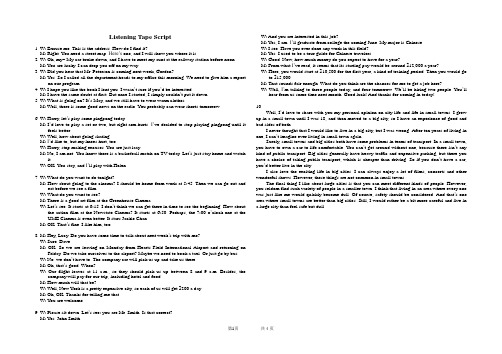
Listening Tape Script1. W: Excuse me. This is the address. How do I find it?M: Right. You need a street map. Here’s one, and I will show you where it is.2. W: Oh, my~ My car broke down, and I have to meet my aunt at the railway station before noon. M: You are lucky. I can drop you off on my way.3. W: Did you hear that Mr. Peterson is coming next week, Gorden?M: Yes. So I called all the department heads to my office this morning. We need to give him a report on our program.4. W: I hope you like the book I lent you. I wasn’t sure if you’d be interested.M: I have the same doubt at first. But once I started, I simply couldn’t put it down.5. W: What is going on? It’s May, and we still have to wear warm clothes.M: Well, there is some good news on the radio. You probably can wear shorts tomorrow.6. W: Harry, let’s play some pingpong today.M: I’d love to play a set or two, but right arm hurts. I’ve decided to stop playing pingpong until it feels better.W: Well, how about going skating.M: I’d like to, but my knees hurt, too.W: Harry, stop making excuses. You are just lazy.M: No, I am not. You know there is a basketball match on TV today. Let’s just stay home and watch it.W: OK. You stay, and I’ll play with Helen.7. W: What do you want to do tonight?M: How about going to the cinema? I should be home from work at 5:45. Then we can go out and eat before we see a film.W: What do you want to see?M: There is a good art film at the Greenhouse Cinema.W: Let’s see. It starts at 6:15. I don’t think we can get there in time to see the beginning. How about the action film at the Newstate Cinema? It starts at 6:50. Perhaps, the 7:00 o’clock one at the UME Cinema is even better. It stars Jackie Chan.M: OK. That’s fine. I like him, too.8. M: Hey, Lucy. Do you have some time to talk about next week’s trip with me?W: Sure. Dave.M: OK. So we are leaving on Monday from Hearts Field International Airport and returning on Friday. Do we take ourselves to the airport? Maybe we need to book a taxi. Or just go by bus. W: No. we don’t have to. The company car will pick us up and take us there.M: Oh, that’s good. When?W: Our flight leaves at 11 a.m., so they should pick us up between 8 and 9 a.m. Besides, the company will pay for our trip, including hotel and food.M: How much will that be?W: Well, New York is a pretty expensive city, so each of us will get $200 a day.M: Oh, OK. Thanks for telling me that.W: You are welcome.9. W: Please sit down. Let’s see: you are Mr. Smith. Is that correct?M: Yes. John Smith.W: And you are interested in this job?M: Yes, I am. I’ll graduate from college the coming June. My major is Chinese.W: I see. Have you ever done any work in this field?M: Yes. I used to be a tour guide for Chinese travelers.W: Good. Now, how much money do you expect to have for a year?M: From what I’ve read, it seems that its starting pay would be around $12,000 a year?W: Here, you would start at $10,500 for the first year, a kind of training period. Then you would go to $15,000.M: That sounds fair enough. What do you think are the chances for me to get a job here?W: Well, I’m talking to three people today, and four tomorrow. We’ll be hiring two people. You’ll hear from us some time next month. Good luck! And thanks for coming in today!10.Well, I’d love to share with you my personal opinion on city life and life in small towns. I grew up in a small town until I was 18, and then moved to a big city, so I have an experience of good and bad sides of both.I never thought that I would like to live in a big city, but I was wrong. After ten years of living in one, I can’t imagine ever living in small town again.Surely, small towns and big cities both have some problems in terms of transport. In a small town, you have to own a car to life comfortable. You can’t get around without one, because there isn’t any kind of public transport. Big cities generally have heavy traffic and expensive parking, but there you have a choice of taking public transport, which is cheaper than driving. So if you don’t have a car, you’d better live in the city.I also love the exciting life in big cities. I can always enjoy a lot of films, concerts and other wonderful shows. However, these things are not common in small towns.The final thing I like about large cities is that you can meet different kinds of people. However, you seldom find such variety of people in a smaller town. I think that living in an area where every one was just like me would quickly become dull. Of course, safety should be considered. And that’s one area where small towns are better than big cities. Still, I would rather be a bit more careful and live in a large city than feel safe but dull.第1页共4页。
2014年普通高等学校招生全国统一考试全国1卷英语试题与参考答案
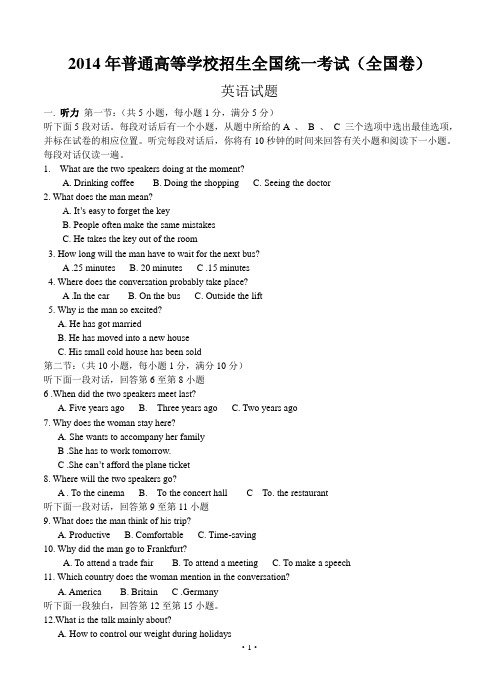
2014年普通高等学校招生全国统一考试(全国卷)英语试题一. 听力第一节:(共5小题,每小题1分,满分5分)听下面5段对话。
每段对话后有一个小题,从题中所给的A 、B 、C 三个选项中选出最佳选项,并标在试卷的相应位置。
听完每段对话后,你将有10秒钟的时间来回答有关小题和阅读下一小题。
每段对话仅读一遍。
1.What are the two speakers doing at the moment?A. Drinking coffeeB. Doing the shoppingC. Seeing the doctor2. What does the man mean?A. It‟s easy to forget the keyB. People often make the same mistakesC. He takes the key out of the room3. How long will the man have to wait for the next bus?A .25 minutes B. 20 minutes C .15 minutes4. Where does the conversation probably take place?A .In the car B. On the bus C. Outside the lift5. Why is the man so excited?A. He has got marriedB. He has moved into a new houseC. His small cold house has been sold第二节:(共10小题,每小题1分,满分10分)听下面一段对话,回答第6至第8小题6 .When did the two speakers meet last?A. Five years agoB. Three years agoC. Two years ago7. Why does the woman stay here?A. She wants to accompany her familyB .She has to work tomorrow.C .She c an‟t afford the plane ticket8. Where will the two speakers go?A . To the cinema B. To the concert hall C To. the restaurant听下面一段对话,回答第9至第11小题9. What does the man think of his trip?A. ProductiveB. ComfortableC. Time-saving10. Why did the man go to Frankfurt?A. To attend a trade fairB. To attend a meetingC. To make a speech11. Which country does the woman mention in the conversation?A. AmericaB. Britain C .Germany听下面一段独白,回答第12至第15小题。
2014年高考英语听力(全国卷)

2014年普通高等学校招生全国统一考试英语第I卷第一部分听力(共两节,满分30分)做题时,先将答案标在试卷上。
录音内容结束后,你将有两分钟的时间将试卷上的答案转涂到答题卡上。
第一节(共5小题;每小题1.5分,满分7.5分)听下面5段对话。
每段对话后有一个小题,从题中所给的A、B、C三个选项中选出最佳选项,并标在试卷的相应位置。
听完每段对话后,你都有10秒钟的时间来回答有关小题和阅读下一小题。
每段对话仅读一遍。
例:How much is the shirt?A. £19.15.B. £9.18.C. £9.15.答案是C。
1. What does the woman want to do?A. Find a place.B. Buy a map.C. Get an address.2. What will the man do for the woman?A. Repair her car.B. Give her a ride.C. Pick up her aunt.3. Who might Mr. Peterson be?A. A new professor.B. A department head.C. A company director.4. What does the man think of the book?A. Quite difficult.B. Very interesting.C. Too simple.5. What are the speakers talking about?A. Weather.B. Clothes.C. News.第二节(共15小题;每小题1.5分,满分22.5分)听下面5段对话或独白。
每段对话或独白后有几个小题,从题中所给的A、B、C三个选项中选出最佳选项,并标在试卷的相应位置。
听每段对话或独白前,你将有时间阅读各个小题,每小题5秒钟;听完后,各小题给出5秒钟的作答时间。
2014年全国新课标卷听力(含答案和原文)

第一部分听力(共两节,满分30分)做题时,先将答案标在试卷上。
录音内容结束后,你将有两分钟的时间将试卷上的答案转涂到答题卡上。
第一节(共5小题;每小题 1.5分,满分7.5分)听下面5段对话。
每段对话后有一个小题,从题中所给的A、B、C三个选项中选出最佳选项,并标在试卷的相应位置。
听完每段对话后,你都有10称钟的时间来回答有关小题如阅读下一小题。
每段对话仅读一遍。
例:How much is the shirt? A. £19.15. B. £9.18. C. £9.15. 答案是C。
1. What does the woman want to do?A. Find a place.B. Buy a map.C. Get an address.2. What will the man do for the woman?A. Repair her car.B. Give her a ride..C. Pick up her aunt.3. Who might Mr. Peterson be?A. A new professor.B. A department head.C. A company director.4. What does the man think of the book?A. Quite difficult..B. Very interesting.C. Too simple.5. What are the speakers talking about?A. Weather.B. Clothes.C. News.第二节(共15小题;每小题1.5分,满分22.5分)听下面5段对话或独白。
每段对话或独白后有几个小题,从题中所给的A、B、C三个选项中选出最佳选项,并标在试卷的相应位置。
听每段对话或独白前,你将有时间阅读各个小题,每小题5秒钟;听完后,各小题将给出5秒钟的作答时间。
每段对话或独白读两遍。
2014年高考听力

2014年高考课标全国Ⅰ卷第一部分听力(共两节,满分30分)第一节(共5小题;每小题1.5分,满分7.5分)听下面5段对话。
每段对话后有一个小题,从题中所给的A、B、C三个选项中选出最佳选项,并标在试卷的相应位置。
听完每段对话后,你都有10秒钟的时间来回答有关小题和阅读下一小题。
每段对话仅读一遍。
例:How much is the shirt?A. £19.15.B. £9.18.C. £9.15.答案是C。
1. What does the woman want to do?A. Find a place.B. Buy a map.C. Get an address.2. What will the man do for the woman?A. Repair her car.B. Give her a ride.C. Pick up her aunt.3. Who might Mr. Peterson be?A. A new professor.B. A department head.C. A company director.4. What does the man think of the book?A. Quite difficult.B. Very interesting.C. Too simple.5. What are the speakers talking about?A. Weather.B. Clothes.C. News.第二节(共15小题;每小题1.5分,满分22.5分)听下面5段对话或独白。
每段对话或独白后有几个小题,从题中所给的A、B、C三个选项中选出最佳选项,并标在试卷的相应位置。
听每段对话或独白前,你将有时间阅读各个小题,每小题5秒钟;听完后,各小题给出5秒钟的作答时间。
每段对话或独白读两遍。
听第6段材料,回答第6、7题。
6. Why is Harry unwilling to join the woman?A. He has a pain in his knee.B. He wants to watch TV.C. He is too lazy.7. What will the woman probably do next?A. Stay at home.B. Take Harry to hospital.C. Do some exercise.听第7段材料,回答第8、9题。
2014年全国新课标卷听力(含答案和原文)

2014年全国新课标卷听力(含答案和原文)7.What does the woman suggest Harry do?A。
Take a walk with her later。
B。
Watch TV with her。
C。
Rest and take some medicine.Rewritten:Part 1 Listening (30 points in total)During the test。
please mark your answers on the n paper first。
After the。
content is finished。
you will have two minutesto ___.n 1 (7.5 points in total)Listen to the following 5 dialogues。
After each dialogue。
there is a n。
Choose the best answer from the three ns (A。
B。
C) and mark it on the corresponding n on the n paper。
You will have10 seconds to answer each ___.___: How much is the shirt。
A.£19.15.B.£9.18.C.£9.15.The answer is C.1.What does the woman want to do?A。
Find a place。
B。
Buy a map。
C。
Get an address.2.What will the man do for the woman?A。
Repair her car。
B。
Give her a ride。
C。
Pick up her aunt.3.Who might Mr。
Peterson be?___.4.What does the man think of the book?A。
2014年高考英语听力试题(新课标Ⅰ卷)含答案
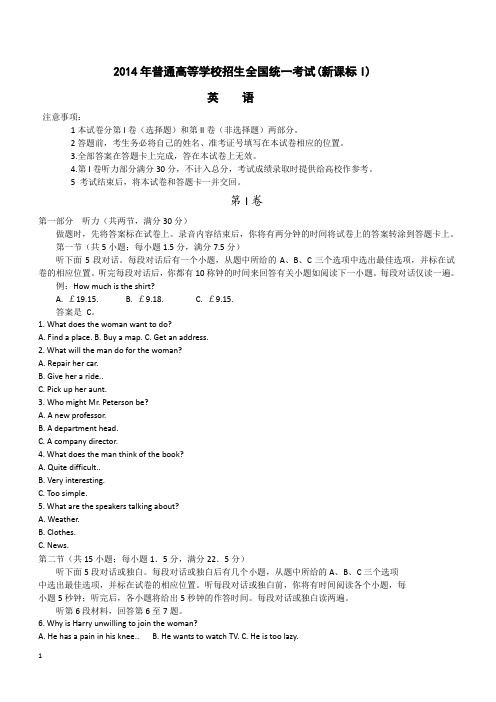
2014年普通高等学校招生全国统一考试(新课标I)英语注意事项:1本试卷分第I卷(选择题)和第II卷(非选择题)两部分。
2答题前,考生务必将自己的姓名、准考证号填写在本试卷相应的位置。
3.全部答案在答题卡上完成,答在本试卷上无效。
4.第I卷听力部分满分30分,不计入总分,考试成绩录取时提供给高校作参考。
5 考试结束后,将本试卷和答题卡一并交回。
第I卷第一部分听力(共两节,满分30分)做题时,先将答案标在试卷上。
录音内容结束后,你将有两分钟的时间将试卷上的答案转涂到答题卡上。
第一节(共5小题;每小题1.5分,满分7.5分)听下面5段对话。
每段对话后有一个小题,从题中所给的A、B、C三个选项中选出最佳选项,并标在试卷的相应位置。
听完每段对话后,你都有10称钟的时间来回答有关小题如阅读下一小题。
每段对话仅读一遍。
例:How much is the shirt?A. £19.15.B. £9.18.C. £9.15.答案是C。
1. What does the woman want to do?A. Find a place.B. Buy a map.C. Get an address.2. What will the man do for the woman?A. Repair her car.B. Give her a ride..C. Pick up her aunt.3. Who might Mr. Peterson be?A. A new professor.B. A department head.C. A company director.4. What does the man think of the book?A. Quite difficult..B. Very interesting.C. Too simple.5. What are the speakers talking about?A. Weather.B. Clothes.C. News.第二节(共15小题;每小题1.5分,满分22.5分)听下面5段对话或独白。
2014年普通高等学校招生全国统一考试(课标全国卷I) 英语 听力试题

2014年普通高等学校招生全国统一考试(课标全国卷I)第一部分听力(共两节,满分30分)第一节(共5小题;每小题1.5分,满分7.5分)听下面5段对话。
每段对话后有一个小题,从题中所给的A、B、C三个选项中选出最佳选项,并标在试卷的相应位置。
听完每段对话后,你都有10秒钟的时间来回答有关小题和阅读下一小题。
每段对话仅读一遍。
例:How much is the shirt?A. £ 19.15.B. £ 9.18.C. £ 9.15.答案是C。
1. What does the woman want to do?A. Find a place.B. Buy a map.C. Get an address.2. What will the man do for the woman?A. Repair her car.B. Give her a ride.C. Pick up her aunt.3. Who might Mr. Peterson be?A. A new professor.B. A department head.C. A company director.4. What does the man think of the book?A. Quite difficult.B. Very interesting.C. Too simple.5. What are the speakers talking about?A. Weather.B. Clothes.C. News.第二节(共15小题;每小题1.5分,满分22.5分)听下面5段对话或独白。
每段对话或独白后有几个小题,从题中所给的A、B、C三个选项中选出最佳选项,并标在试卷的相应位置。
听每段对话或独白前,你将有时间阅读各个小题,每小题5秒钟;听完后,各小题将给出5秒钟的作答时间。
每段对话或独白读两遍。
听第6段材料,回答第6、7题。
2014年英语听力(全国卷Ⅰ)听力真题+答案

2014年全国统一高考英语试卷(新课标Ⅰ)第一部分听力(共两节,满分30分)做题时,先将答案标在试卷上.录音内容结束后,你将有两分钟的时间将试卷上的答案转涂到答题卡上.1.(1.5分)What does the woman want to do?A.Find a place B.Buy a map C.Get an address.2.(1.5分)What will the man do for the woman?A.Repair her car.B.Give her a ride.C.Pick up her aunt.3.(1.5分)Who might Mr.Peterson be?A.A new professor.B.A department head.C.A company director.4.(1.5分)What does the man think of the book?A.Quite difficult.B.Very interesting.C.Too simple.5.(1.5分)What are the speakers talking about?A.Weather B.Clothes.C.News.6.(3分)听第6段材料,回答6、7题.6.Why is Harry unwilling to join the woman?A.He has a pain in his knee.B.He wants to watch TV.C.He is too lazy.7.What will the woman probably do next?A.Stay at home.B.Take Harry to hospital.C.Do some exercise.8.(3分)听第7段材料,回答第8、9题.8.When will the man be home from work?A.At 5:45.B.At 6:15.C.At 6:50.9.Where will the speakers go?A.The Green House Cinema.B.The New State Cinema.C.The UME Cinema.10.(4.5分)听第8段材料,回答第10至12题.10.How will the speakers go to New York?A.By air.B.By taxi.C.By bus.11.Why are the speakers making the trip?A.For business.B.For shopping.C.For holiday.12.What is the probable relationship between the speakers?A.Driver and passenger.B.Husband and wife.C.Fellow workers.13.(6分)听第9段材料,回答第13~16题.13.Where does this conversation probably take place?A.In a restaurant.B.In an office.C.In a classroom.14.What does John do now?A.He's a trainer.B.He's a tour guide.C.He's a college student.15.How much can a new person earn for the first year?A.10,500.B.12,000.C.15,000.16.How many people will the woman hire?A.Four.B.Three.C.Two.17.(6分)听第10段材料,回答第17至20题17.How long has the speaker lived in a big city?A.One year B.Ten years C.Eighteen years.18.What is the speaker's opinion on public transport?A.It's comfortable B.It's time﹣saving C.It's cheap.19.What is good about living in a small town?A.It's safer B.It's healthier C.It's more convenient.20.What kind of life does the speaker seem to like most?A.Busy B.Colorful C.Quiet.。
2014年高考英语听力(全国卷)

We are going to take one of the most important exams in China and I am going to talk about one important part of the exam. That part is listening.2014年普通高等学校招生全国统一考试英语第I卷第一部分听力(共两节,满分30分)做题时,先将答案标在试卷上。
录音内容结束后,你将有两分钟的时间将试卷上的答案转涂到答题卡上。
第一节(共5小题;每小题1.5分,满分7.5分)听下面5段对话。
每段对话后有一个小题,从题中所给的A、B、C三个选项中选出最佳选项,并标在试卷的相应位置。
听完每段对话后,你都有10秒钟的时间来回答有关小题和阅读下一小题。
每段对话仅读一遍。
例:How much is the shirt?A. £19.15.B. £9.18.C. £9.15.答案是C。
1. What does the woman want to do?A. Find a place.B. Buy a map.C. Get an address.2. What will the man do for the woman?A. Repair her car.B. Give her a ride.C. Pick up her aunt.3. Who might Mr. Peterson be?A. A new professor.B. A department head.C. A company director.4. What does the man think of the book?A. Quite difficult.B. Very interesting.C. Too simple.5. What are the speakers talking about?A. Weather.B. Clothes.C. News.第二节(共15小题;每小题1.5分,满分22.5分)听下面5段对话或独白。
2014高考英语全国I卷听力试题及录音原文(音频下载+参考答案)
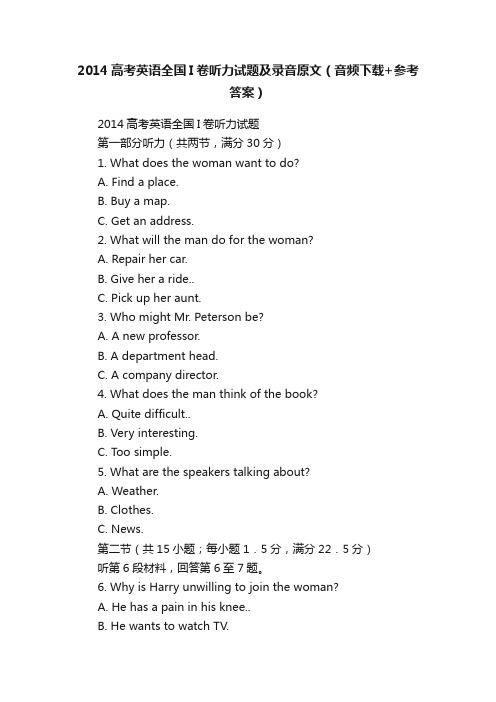
2014高考英语全国I卷听力试题及录音原文(音频下载+参考答案)2014高考英语全国I卷听力试题第一部分听力(共两节,满分30分)1. What does the woman want to do?A. Find a place.B. Buy a map.C. Get an address.2. What will the man do for the woman?A. Repair her car.B. Give her a ride..C. Pick up her aunt.3. Who might Mr. Peterson be?A. A new professor.B. A department head.C. A company director.4. What does the man think of the book?A. Quite difficult..B. Very interesting.C. Too simple.5. What are the speakers talking about?A. Weather.B. Clothes.C. News.第二节(共15小题;每小题1.5分,满分22.5分)听第6段材料,回答第6至7题。
6. Why is Harry unwilling to join the woman?A. He has a pain in his knee..B. He wants to watch TV.C. He is too lazy.7. What will the woman probably do next?A. Stay at home.B. Take Harry to hospital.C. Do some exercise.听第7段材料,回答第8 、9题。
8. When will the man be home from work?A. At 5:45.B. At 6:15.C. At 6:50.9. Where will the speakers go ?'A. The Green House Cinema.B. The New State Cinema .C. The UME Cinema.听第8段材料,回答第10至12题。
2014年全国高考英语听力卷试题答案 听力原文

2014年一般高等学校招生全国统一考试英语第I卷第一局部听力(共两节,满分30分)做题时,先将答案标在试卷上。
录音内容完毕后,你将有两分钟的时间将试卷上的答案转涂到答题卡上。
第一节(共5小题;每小题1.5分,满分7.5分)听下面5段对话。
每段对话后有一个小题,从题中所给的A、B、C三个选项中选出最佳选项,并标在试卷的相应位置。
听完每段对话后,你都有10秒钟的时间来答复有关小题与阅读下一小题。
每段对话仅读一遍。
例:How much is the shirt?A. £19.15.B. £9.18.C. £9.15.答案是C。
1. What does the woman want to do?A. Find a place.B. Buy a map.C. Get an address.2. What will the man do for the woman?A. Repair her car.B. Give her a ride.C. Pick up her aunt.3. Who might Mr. Peterson be?A. A new professor.B. A department head.C. A company director.4. What does the man think of the book?A. Quite difficult.B. Very interesting.C. Too simple.5. What are the speakers talking about?A. Weather.B. Clothes.C. News.第二节(共15小题;每小题1.5分,满分22.5分)听下面5段对话或独白。
每段对话或独白后有几个小题,从题中所给的A、B、C三个选项中选出最佳选项,并标在试卷的相应位置。
听每段对话或独白前,你将有时间阅读各个小题,每小题5秒钟;听完后,各小题给出5秒钟的作答时间。
2014年高考真题英语听力原文附答案(全国卷)
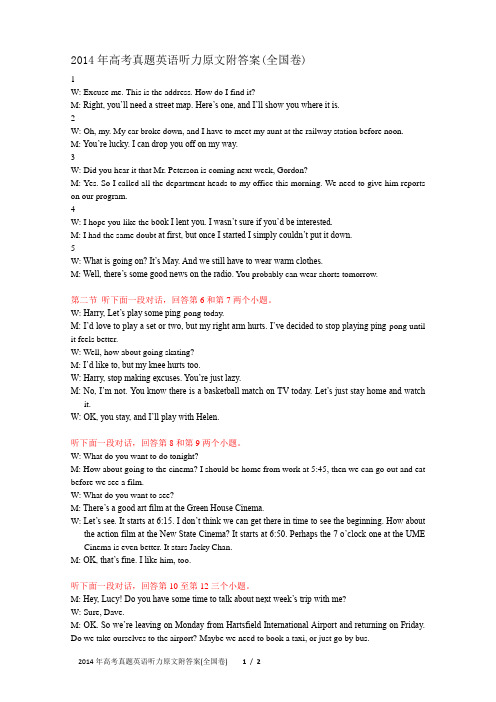
2014年高考真题英语听力原文附答案(全国卷)1W: Excuse me. This is the address. How do I find it?M: Right, you’ll need a street map. Here’s one, and I’ll show you where it is.2W: Oh, my. My car broke down, and I have to meet my aunt at the railway station before noon.M: You’re lucky. I can drop you off on my way.3W: Did you hear it that Mr. Peterson is coming next week, Gordon?M: Yes. So I called all the department heads to my office this morning. We need to give him reports on our program.4W: I hope you like the b ook I lent you. I wasn’t sure if you’d be interested.M: I had the same doubt at first, but once I started I simply couldn’t put it down.5W: What is going on? It’s May. And we still have to wear warm clothes.M: Well, there’s some good news on the radio. You probably can wear shorts tomorrow.第二节听下面一段对话,回答第6和第7两个小题。
- 1、下载文档前请自行甄别文档内容的完整性,平台不提供额外的编辑、内容补充、找答案等附加服务。
- 2、"仅部分预览"的文档,不可在线预览部分如存在完整性等问题,可反馈申请退款(可完整预览的文档不适用该条件!)。
- 3、如文档侵犯您的权益,请联系客服反馈,我们会尽快为您处理(人工客服工作时间:9:00-18:30)。
2014全国卷:1. What does the woman want to do? AA. Find a place.B. Buy a map.C. Get an address.2. What will the man do for the woman? BA. Repair her car.B. Give her a ride.C. Pick up her aunt.3. Who might Mr. Peterson be? CA. A new professor.B. A department head.C. A company director.4. What does the man think of the book? BA. Quite difficult.B. Very interesting.C. Too simple.5. What are the speakers talking about? AA. Weather.B. Clothes.C. News.第二节(共15小题;每小题1.5分,满分22.5分)听下面5段对话或对白。
每段对话或独白后有几个小题,从题中所给的A、B、C三个选项中选出最佳选项,并标在试卷的相应位置。
听每段对话或独白前,你将有时间阅读各个小题,每小题5秒钟;听完后,各小题给出5秒钟的作答时间。
每段对话或独白读两遍。
听第6段材料,回答第6、7题。
6. Why is Harry unwilling to join the woman? BA. He has a pain in his knee.B. He wants to watch TV.C. He is too lazy.7. What will the woman probably do next? C 6’50”A. Stay at home.B. Take Harry to hospital.C. Do some exercise.听第7段材料,回答第8、9题。
8. When will the man be home from work? AA. At 5:45.B. At 6:15.C. At 6:50.9. Where will the speakers go? CA. The Green House Cinema.B. The New State Cinema.C. The UME Cinema.听第8段材料,回答第10至12题。
10. How will the speakers go to New York? AA. By air.B. By taxi.C. By bus.11. Why are the speakers making the trip? AA. For business.B. For shopping.C. For holiday.12. What is the probable relationship between the speakers? CA. Driver and passenger.B. Husband and wife.C. Fellow workers. 听第9段材料,回答第13至16题。
13. Where does this conversation probably take place? BA. In a restaurant.B. In an office.C. In a classroom.14. What does John do now? CA. He’s a trainer.B. He’s a tour guide.C. He’s a college student.15. How much can a new person earn for the first year? AA. $10,500.B. $12,000.C. $15,000.16. How many people will the woman hire? CA. Four.B. Three.C. Two.听第10段材料,回答第17至20题。
17. How long has the speaker lived in a big city? BA. One year.B. Ten years.C. Eighteen years.18. What is the speaker’s opinion on public transport? CA. It’s comfortable.B. It’s time-saving.C. It’s cheap.19. What is good about living in a small town? AA. It’s safer.B. It’s healthier.C. It’s more convenient.20. What kind of life does the speaker seem to like most? BA. Busy.B. Colorful.C. Quiet.1. A2. B3. C4. B5. A6. B7. C8. A9. C 10. A11. A 12. C 13. B 14. C 15. A 16. C 17. B 18. C 19. A 20. B2014年高考全国卷英语听力材料录音原文Text 1W: Excuse me. This is the address. How do I find it?M: Right. You’ll need a street map. Here’s one, and I’ll show you where it is.Text 2W: Oh my! My car broke down, and I have to meet my aunt at the railway station before noon.M: You’re lucky. I can drop you off on my way.Text 3W: Did you hear that Mr. Peterson is coming next week, Gordon?M: Yes, so I called all the department heads to my office this morning. We need to give him reports on our program.Text 4W: I hope you li ke the book I lent you. I wasn’t sure if you’d be interested.M: I had the same doubt at first. But once I started, I simply couldn’t put it down.Text 5W: What is going on? It’s May, and we still have to wear warm clothes.M: Well, there’s some good news on the radio. You probably can wear shorts tomorrow.Text 6W: Harry, let’s play some ping-pong today.M: I’d love to play a set or two, but my right arm hurts. I’ve decided to stop playingping-pong until it feels better.W: Well, how about going skating?M: I’d like to, but my knee hurts, too.W: Harry, stop making excuses! You’re just lazy.M: No, I’m not! You know, there’s a basketball match on TV today. Let’s just stay home and watch it.W: OK. You stay, and I’ll play with Helen.Text 7W: What do you want to do tonight?M: How about going to the cinema? I should be home from work at 5:45. Then we can go out and eat before we see a film.W: What do you want to see?M: There’s a good art film at the Green House Cinema.W: Let’s see…it starts at 6:15. I don’t think we can get there in time to see the beginning. How about the action film at the New State Cinema? It starts at 6:50. Perhaps the 7:00 one at the UME Cinema is even better. It stars Jackie Chan.M: OK, that’s fine. I like him, too.Text 8M: H ey, Lucy. Do you have some time to talk about next week’s trip with me?W: Sure, Dave.M: OK. So, we’re leaving on Monday from Hartsfield International Airport, and returning on Friday. Do we take ourselves to the airport? Maybe we need to book a taxi, or just go by bus.W: No, we don’t have to. The company car will pick us up and take us there.M: Oh, that’s good. When?W: Our flight leaves at 11:00 a.m., so they should pick us up between 8:00 and 9:00 a.m. Besides, the company pays for our trip, including hotel and food.M: How much will that be?W: Well, New York is a pretty expensive city. So, each of us will get $200 a day.M: Oh, OK. Thanks for telling me that.W: You’re welcome.Text 9W: Please sit down. Let’s see…you’re Mr. Smith. Is that correct?M: Yes. John Smith.W: And you’re interested in this job?M: Yes, I am. I’ll graduate from college the coming June. My major is Chinese.W: I see. Have you ever done any work in this field?M: Yes, I used to be a tour guide for Chinese travellers.W: Good. Now, how much money do you expect to have for a year?M: From what I’ve read, it seems that a starting pay would be around $12,000 a year.W: Here, you would start at $10,500 for the first year…a kind of training period. Then you would go to $15,000.M: That sounds fair enough. What do you think are the chances for me to get a job here?W: Well, I’m talking to three people today and four tomorrow. We’ll be hiring two people. You’ll hear from us sometime next month. Good luck! And thanks for coming in to day.Text 10M: Well, I’d love to share with you my personal opinions on city life and life in small towns. I grew up in a small town until I was 18 and then moved to a big city, so I have experienced the good and bad sides of both. I never thought that I would like living in a big city, but I was wrong. After ten years of living in one, I can’t imagine ever living in a small town again. Surely small towns and big cities both have some problems in terms of transport. In a small town, you have to own a car t o make life comfortable. You can’t get around without one because there isn’t any kind of public transport. Big cities generally have heavy traffic and expensive parking, but there you have a choice of taking public transport, which is cheaper than driving. So, if you don’t have a car, you’d better live in the city. I also love the exciting life in big cities. I can always enjoy a lot of films, concerts, and other wonderful shows. However, these things are not common in small towns. The final thing I like about large cities is that you can meet different kinds of people. However, you seldom find such a variety of people in a smaller town. I think that living in an area where everyone was just like me would quickly become dull. Of course, safety should be con sidered, and that’s one area where small towns are better than big cities. Still, I would rather be a bit more careful and live in a large city than to feel safe but dull.。
